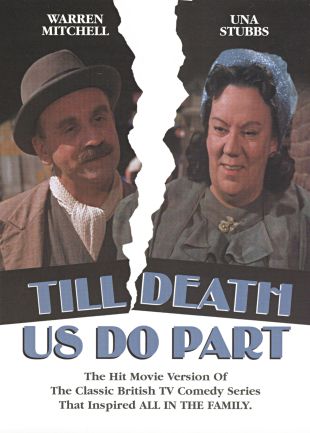Americans can be forgiven for not being familiar with Till Death Us Do Part -- it was, apart from one significant television spin-off, a purely British phenomenon. The series Till Death Us Do Part was a minor international milestone in rock music history, as the debut of Ray Davies as film songwriter for the title track, working in a vein similar to that explored in Arthur or The Village Green Preservation Society. The television series never ran in the United States, where its deeply inflected cockney slang, not to mention the racist diatribes of its protagonist, Alf Garnett, would not have played at all; the idea behind it was transformed into All in the Family, but that's as close as viewers ever got to the original on this side of the Atlantic. This feature film was made in 1969 exclusively for the British market (never even getting a rating for U.S. release), taking the characters backward in time, initially three decades, to the end of the 1930s. We see a much younger Alf Garnett (Warren Mitchell) and his wife, Else (Dandy Nichols), coping with the effects of the worldwide depression and the growing threat of Hitler. Even here, Alf can't resist parenthetically bad-mouthing the Ethiopians in the course of blustering about what Hitler or Mussolini will find if they attack England.
The opening credit sequence offers a worthy depiction of lower-class life in pre-war London (especially set to Davies' song); the camera pans past little vignettes of life among the working poor, coupled with some subtle dissolves into a larger montage that brings us right up to date and up close to the characters and their reality. One fascinating and telling image in this segment shows a British fascist speaker in the street, attracting a sparse crowd. That points to the most interesting element of this movie -- its seriousness. As funny as many of the scenes and performances are, one never gets far from the dramatic side of the setting and era, whether it's a tavern owner lamenting the loss of 20 regular customers in the German blitz who also owed him money, or the crowds jammed into the London Underground tubes. Yet, even there, Alf's character manifests itself in his inimitable way, rising up in fury when the huddled group of night-time refugees starts singing "Lili Marlene," which he regards as a disloyal act, as it is a German song (it was internationally popular before the war). Even more fascinating is the scene depicting the aftermath of the Japanese surrender, in which Alf insults the Japanese, declaring the white race's moral superiority, while his wife listens, staring off into space, an uneasy look in her eyes. The series was often criticized as heavy-handed, but the writer Johnny Speight knew how to quietly telegraph complexities about these characters that were perhaps too subtle for certain critics.

The second half of the movie brings us up to the point of the series' beginnings, showing Alf's daughter Rita's (Una Stubbs) marriage to a young Socialist (Anthony Booth). This section of the movie shows Alf's gradual devolution into a near-fascist, even talking of how England should have allied itself with Hitler during the war to wipe out "the Russians and the yellow races," yet getting drunk and falling asleep praising Churchill. Alf is a mass of contradictions, growing teary-eyed at the sight of the queen at a sporting event and standing and saluting during the playing of "God Save the Queen," yet cursing the British government to high heaven; screaming at his fellow man, yet praying sincerely and poignantly to try and keep the house in which he lives. And that's the secret behind this movie and the series from which it is derived: Warren Mitchell. He brings so much humanity to this sad yet proud, often infuriating man, that you can't take your eyes off of him -- he may be one of England's finest actors. And he makes this film intriguing, regardless of whether one knows the original series or not.
